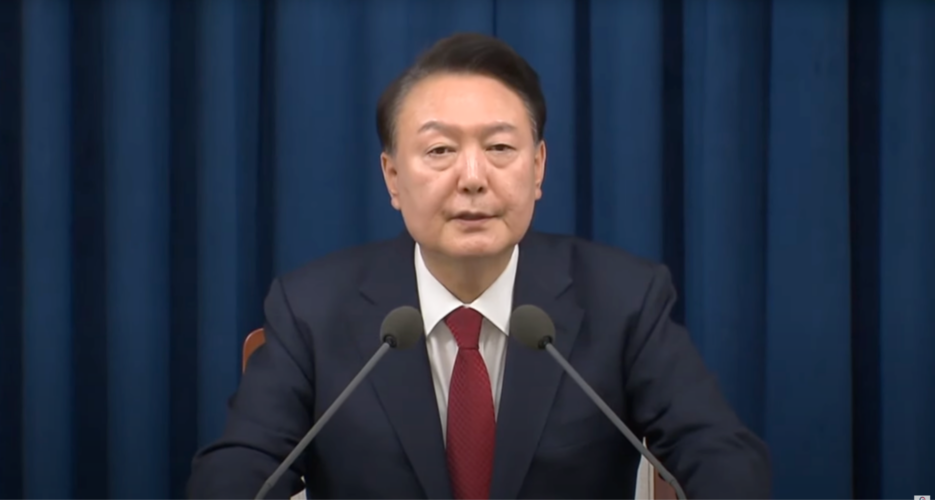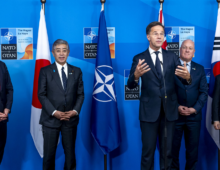|
Analysis South Korea grapples with fallout from president’s martial law declarationYoon Suk-yeol’s actions have sparked far-reaching national crisis, heightening uncertainty as he faces impeachment John LeeDecember 4, 2024  President Yoon Suk-yeol announces he will withdraw martial law a few hours after he invoked it, Dec. 4, 2024 | Image: KTV via YouTube South Korean President Yoon Suk-yeol’s imposition of martial law, although brief, has sent shockwaves throughout the country, raising urgent questions about the limits of executive power, the military’s role in governance and the future stability of its democratic institutions. In a televised address late on Tuesday, Yoon justified his declaration citing the alleged threat of “anti-state forces” — primarily opposition lawmakers — undermining the nation’s liberal constitutional order. The president alleged that the opposition had abused impeachment powers against 22 government officials since the start of his administration. He also accused lawmakers of weaponizing the budget process by slashing funds for national security, disaster relief and public welfare, thereby “crippling essential state functions.” This marked the first martial law declaration in South Korea since 1979, when General Chun Doo-hwan seized power in the wake of President Park Chung-hee’s assassination. Following Yoon’s address, security forces stormed the National Assembly, clashing with parliamentary staff as lawmakers worked to convene an emergency session. In a rare display of unity, 190 lawmakers, including 17 ruling People Power Party lawmakers, voted unanimously to nullify the martial law declaration, effectively ending its implementation within hours. However, the episode has left South Korea in a state of political turmoil and has raised the serious possibility of Yoon’s impeachment before week’s end. The president’s ouster would have a significant impact on the country’s domestic politics, governance, foreign policy and the economy, making this crisis one of the most consequential in South Korea’s modern democratic history.  South Korean President Yoon Suk-yeol meets with former President Park Geun-hye, Nov. 7, 2023 | Image: ROK Presidential Office DOMESTIC POLITICAL IMPLICATIONS Impeachment proceedings against Yoon are all but inevitable. Main opposition Democratic Party (DP) leader Lee Jae-myung labeled the declaration unconstitutional and procedurally invalid, citing Yoon’s failure to secure the required Cabinet approval. Dissent is emerging even within the ruling People Power Party (PPP). Floor leader Choo Kyung-ho admitted he was unaware of Yoon’s intentions, while party leader Han Dong-hoon, a former justice minister and close ally of Yoon, openly criticized the decision. These developments signal not only Yoon’s growing isolation but also the potential fragmentation of the PPP as lawmakers distance themselves to protect their political futures. The crisis has also galvanized opposition parties, particularly the DP, which will likely leverage the situation to consolidate power. Lee Jae-myung’s forceful condemnation of the martial law declaration and calls for accountability will likely resonate with a public increasingly wary of executive overreach. Moreover, minor opposition parties, including the Rebuilding Korea Party and the Reform Party, have joined the chorus of criticism, forcefully arguing that Yoon must be removed from office. Public reaction has been equally decisive. Protests erupted outside the National Assembly as news of the martial law declaration spread, with demonstrators demanding immediate action to nullify the decree. Public sentiment, already critical of Yoon’s leadership, could further galvanize calls for his removal, potentially reshaping the country’s political landscape ahead of future elections. While the swift revocation of martial law has tempered immediate unrest, the episode will likely leave lasting scars. Trust in the presidency and the military will likely be eroded. The image of armed troops storming the National Assembly will likely linger in the public consciousness, reminding citizens of the country’s authoritarian past. These debates will inevitably extend to South Korea’s constitutional framework, and the crisis could reignite discussions about the need to curtail executive power, particularly in emergencies. Proposals to strengthen legislative oversight and impose stricter procedural requirements for martial law declarations will likely gain traction. If enacted, such reforms could mark a turning point in South Korea’s democratic evolution by curbing the powers of its imperial presidency and reinforcing institutional checks and balances. FOREIGN POLICY IMPLICATIONS The political turmoil could also impact South Korea’s security partners, particularly the U.S. and Japan. As a democratic country with a robust military, South Korea’s stability is vital to maintaining stability in the Indo-Pacific. The martial law crisis, however brief, risks undermining confidence in the country’s’s ability to fulfill its commitments under trilateral and multilateral agreements. South Korea hosts a significant U.S. military presence, and any signs of instability could prompt reassessments of joint security operations. U.S. officials have stated that they are closely monitoring the situation. Additionally, the crisis may complicate ongoing discussions around South Korea’s participation in initiatives like AUKUS Pillar II, which focuses on advanced technology collaboration, particularly if Yoon is impeached and removed from office. Reassuring allies of South Korea’s stability and continuity in foreign policy will be a priority for the government in the coming weeks. North Korea could exploit the crisis for propaganda purposes, portraying South Korea as politically unstable and unfit to manage security threats. It could also use the chaos as an opportunity to escalate military provocations, testing Seoul’s capacity to respond effectively amid domestic upheaval. Meanwhile, the incident has drawn attention to the fragility of South Korea’s democracy — a stark contrast to its leadership role as host of the Summit for Democracy earlier this year. While the swift nullification of martial law demonstrates the resilience of its institutions, the crisis also exposes vulnerabilities that could impact its reputation as a stable democracy. International observers will be watching closely to see how South Korea handles the impeachment process and addresses the underlying issues that led to this moment, particularly given its efforts to position itself as a global advocate for democratic values.  South Korean defense minister Kim Yong-hyun delivers an address, Nov. 29, 2024 | Image: ROK Ministry of National Defense via Facebook ECONOMIC AND FINANCIAL IMPLICATIONS The economic fallout from the crisis has been immediate, with financial markets reacting sharply to the martial law declaration. The Korean won depreciated significantly in overnight trading, along with cryptocurrency markets. Although markets have stabilized following the revocation of martial law, the uncertainty surrounding Yoon’s political future could deter foreign investment and dampen business confidence. The impeachment process and the resulting political vacuum also risk delaying key economic policies. The National Assembly still has to finalize the 2025 budget, which includes critical allocations for welfare programs, infrastructure projects and economic stimulus measures. Legislative gridlock during impeachment proceedings could stall these initiatives, slowing economic growth and exacerbating business sentiment. Foreign investors may grow wary, potentially affecting capital inflows and South Korea’s standing as a stable investment destination. Beyond domestic concerns, the crisis could impact South Korea’s global trade relationships. Efforts to diversify trade away from China and strengthen ties with Southeast Asia may face delays as political attention shifts inward. Additionally, South Korea’s reputation as a stable investment destination has taken a hit, which could complicate ongoing negotiations with foreign investors. BROADER IMPLICATIONS The martial law crisis has ignited widespread concern over the fragility of civil liberties in South Korea, especially in light of the sweeping powers invoked under the Martial Law Command Proclamation. The brief suspension of constitutional protections — combined with restrictions on political activities, media oversight and public assembly — has highlighted the need to strengthen safeguards against the misuse of emergency powers. Civil society groups and legal experts will likely push for robust legislative reforms that explicitly limit the scope of executive authority during states of emergency. Proposals may include stricter criteria for invoking martial law, enhanced judicial oversight to ensure compliance with constitutional principles, and clearer definitions of prohibited actions to prevent overreach. Specific attention is likely to focus on preventing arbitrary detentions, censorship and blanket restrictions on peaceful assembly, all of which were prominently highlighted in the Martial Law Command Proclamation. Enshrining these protections into law could serve as a vital step toward ensuring that emergency powers are not weaponized for political purposes. Such reforms would not only strengthen South Korea’s democratic institutions but also reassure the public that their rights remain secure, even in moments of national crisis.  South Korean soldiers participate in an armed forces day parade, Sept. 30, 2024 | Image: ROK Ministry of National Defense via Facebook REBUILDING TRUST South Korea’s martial law crisis marks a defining moment in its democratic history. While the swift nullification of the decree highlights the resilience of the country’s institutions, the broader implications for governance, political stability and economic policy are profound. Impeachment proceedings against Yoon will likely dominate the political agenda in the coming weeks, testing the strength of South Korea’s constitutional framework and its commitment to the rule of law. At the same time, the crisis offers an opportunity to address systemic weaknesses exposed by Yoon’s actions. Strengthening checks and balances, safeguarding civil liberties and reaffirming democratic norms will be essential to restoring public trust and ensuring long-term stability. As South Korea works to restore trust in its institutions, the world will be watching to see how the nation strengthens democratic safeguards. Edited by Alannah Hill South Korean President Yoon Suk-yeol’s imposition of martial law, although brief, has sent shockwaves throughout the country, raising urgent questions about the limits of executive power, the military’s role in governance and the future stability of its democratic institutions. In a televised address late on Tuesday, Yoon justified his declaration citing the alleged threat of “anti-state forces” — primarily opposition lawmakers — undermining the nation’s liberal constitutional order. Get your
|
|
Analysis South Korea grapples with fallout from president’s martial law declarationYoon Suk-yeol’s actions have sparked far-reaching national crisis, heightening uncertainty as he faces impeachment  South Korean President Yoon Suk-yeol’s imposition of martial law, although brief, has sent shockwaves throughout the country, raising urgent questions about the limits of executive power, the military’s role in governance and the future stability of its democratic institutions. In a televised address late on Tuesday, Yoon justified his declaration citing the alleged threat of “anti-state forces” — primarily opposition lawmakers — undermining the nation’s liberal constitutional order. © Korea Risk Group. All rights reserved. |











